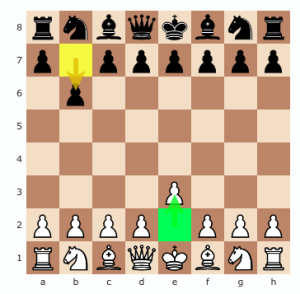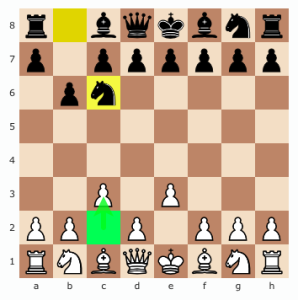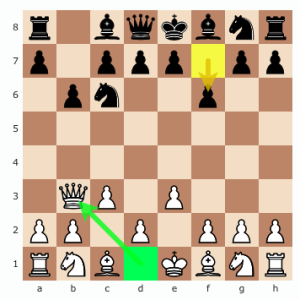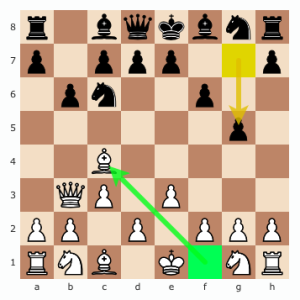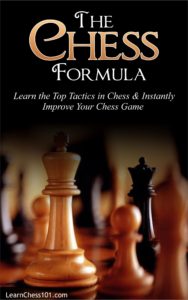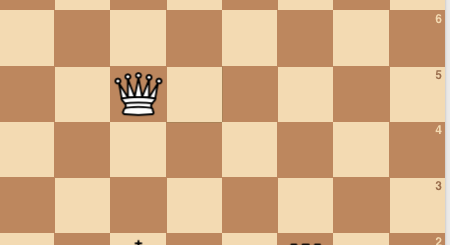How to Win Chess in 5 Moves (5 Move Checkmate)
How to Checkmate in 5 Moves
(5 Move Checkmate)
I came across this 5 move checkmate while playing chess against an opponent. I was trying out different chess strategies and came across a 5 move checkmate that can work effectively against an inexperienced opponent or an opponent caught off guard.
I’m sure I’m not the first person to discover this, but I thought I’d post it on here for everyone to learn from.
About the 5 Move Checkmate
The 5 move checkmate is somewhat similar to the 4 move checkmate in that it involves only the queen and the bishop.
However, there is a slight variation with the 5 move checkmate: Rather than having the bishop on the opposite side of the chessboard, the queen and bishop are on the same side of the chessboard, and it is the bishop who checkmates the King. (Generally speaking, it’s far more advantageous to have the queen in the position of checkmating, since she has a far greater range of capture, but for the 5 move checkmate, it will be the bishop placing the King in checkmate.)
For those learning chess, be sure to also check out the 2 move checkmate (fool’s mate), 3 move checkmate, and 4 move checkmate (Scholar’s Mate):
How to Win Chess in 2 Moves (2 Move Checkmate/Fool’s Mate)
How to Win Chess in 3 Moves ( 3 Move Checkmate)
How to Win Chess in 4 Moves (4 Move Checkmate/Scholar’s Mate)
How to Checkmate in 5 Moves: The 5 Move Checkmate
Like with the 2,3, and 4 move checkmate, this involves your chess opponent not blocking the initial attack or opening up space for their King to avoid checkmate, so keep in mind this is not a guaranteed way to win. Also keep in mind, all opponent’s moves are hypothetical.
Move 1:
The first move is placing your king front pawn up 1 space to E3. Your opponent moves pawn to h,6.
Move 2:
Move your pawn to c,3. Your opponent moves knight to c,6.
Move 3:
Move your queen to b,3. Your opponent moves pawn to f,6. I’ve noticed opponent’s making this move frequently, hoping I’ll capture the knight with my queen, so they can capture my queen with their rook.
Move 4:
Move your bishop to c,4. Your opponent moves their pawn to g,5.
Move 5:
Move your bishop to f,7. There are no chess pieces to capture your bishop, and the king has nowhere to move except where your bishop is, which is protected by the queen. Checkmate! 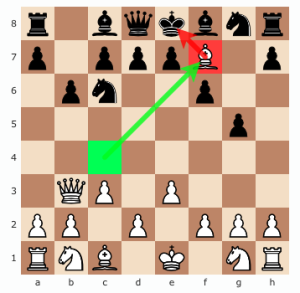
Thing to Keep in Mind with the 5 Move Checkmate
- The most important aspect of the 5 move checkmate is ensuring your bishop is protected by the queen, and that no chess pieces will be able to capture your bishop once placing the King in checkmate.
- You can’t control your opponent’s moves. Make sure your adaptable with your chess strategy.
- While it may be tempting to want to win chess in 5 moves or less, it usually will take longer against an experienced opponent. You can view a 15 move checkmate from a live game here.
- Unlike the 3 or 4 move checkmate, it is the bishop that is checkmating the King, rather than the queen.
- The 5 move checkmate relies on the King being trapped so he cannot escape checkmate, and your opponent not being in a position to capture the bishop.
Purchase Ebook:
The Chess Formula
Learn the Top Tactics in Chess & Instantly Improve Your Chess Game
It’s one thing to learn the 5 move checkmate (which will rarely work against a fairly experienced opponent). It’s another to learn all the top moves in chess that will instantly take your chess game to the next level.
With our new Ebook “The Chess Formula: Learn the Top Tactics in Chess & Instantly Improve Your Chess Game“, that’s exactly what you will learn to do.
The Chess Formula is considered a must have for anyone interested in improving their chess game. This book has been condensed and simplified down to the top tactics in chess that will both improve your ability to capture your opponent’s chess pieces and achieve checkmate, as well as prevent your opponent from capturing your own chess pieces.
Purchase The Chess Formula
Learn More:
Learn Chess 101: Learn How to Play Chess, the Rules of Chess & Basic Chess Strategy
Learn Chess Strategy
Learn How to Correctly Set Up a Chessboard
Learn How to Castle in Chess
Learn How to Perform the En Passant Capture in Chess










